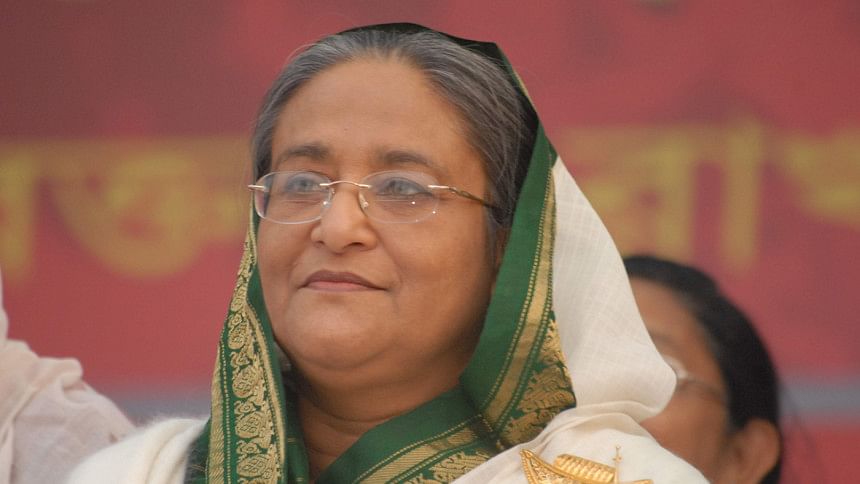PM says she will pitch for Teesta

Prime Minister Sheikh Hasina in an article published in a leading Indian newspaper today expressed the hope that her visit to India would take the cooperative relations between Bangladesh and India to a "new height" and pitched for signing of the Teesta river water-sharing deal.
"On the eve of my four-day visit to India, I myself, and on behalf of my countrymen, would like to convey the heartiest greetings to the people of India. I hope that the cooperative relations between Bangladesh and India would reach a new height through my visit," Hasina wrote on the Opinion page of "The Hindu."
Pointing to the shared cultural heritage and common Bangla language between Bangladesh and West Bengal, Hasina said there was no reason why there should be any contention between the two countries over the waters of common rivers.
"There are some issues between us" (Bangladesh and India). But I believe that any problem can be resolved in a peaceful manner. We have demonstrated our willpower through the implementation of the Land Boundary Agreement. There are some more issues like sharing of waters of the common rivers (the Teesta issue is currently under discussion) that need to be resolved," the Bangladesh PM said.
She said "I know resources are scarce but we can share those for the benefit of the people of both countries. We share the same culture and heritage. There are a lot of commonalities (at least with West Bengal). We share our Lalon, Rabindranath, Kazi Nazrul, Jibanananda; there is similarity in our language, we are nourished by the waters of the Padma, Brahmaputra, Teesta and so on. The Sundarbans is our common pride. We don't have any strife over it. Then, why should there be any contention over the waters of common rivers?"
"I'm an optimistic person. I would like to rest my trust on the goodwill of the great people and the leaders of our neighbour," Hasina writes in the article.
Hasina's remarks in the article assume importance as she would come face to face with West Bengal Chief Minister Mamata Banerjee here twice in the next two days—first on April 8 during a lunch to be hosted by Indian Prime Minister Narendra Modi for Hasina and then again on April 9 when President Pranab Mukherjee gives a dinner to the visiting Bangladesh PM.
She said "cooperation between Bangladesh and India has been bolstered manifold. Rail, road, and waterway connectivity boosted. Trade, commerce and investment maximised. People-to-people contact also got momentum and "such mutual cooperation is definitely benefitting our people."
"Relations, at a personal or national level, largely depend on give-and-take measures," Hasina added.
Quoting Mexican Nobel Laureate Octavio Paz's that 'Friendship is a river', Hasina said "I think that the friendship between Bangladesh and India is like a flowing river and full with generosity. This is the spirit of the people of the two neighbours. I think if our commitments are honest, we would be able to achieve many things that are beneficial to our people."
Hasina recounted the circumstances leading to the start of the Bangladesh Liberation War and expressed gratitude to the people and government of India for helping to win the War and secure the release of Bangabandhu Sheikh Mujibur Rahman from a prison in Pakistan.
"We are grateful to the friendly people of India. The Indian government had played an important role even in getting Bangabandhu released from the Pakistani prison. Shrimati Indira Gandhi had played the leading role in earning our independence, freedom of Bangabandhu and bringing him back to his beloved people. We got her government, political parties and above all the people of India beside us during our hard times," she said in the article.
Hasina also recalled how India stood beside her and her family "in our bad days" post the assassination of the Father of the Nation Bangabandhu Sheikh Mujibur Rahman on August 15, 1975.
"I lost 18 of my family members, including my mother, three brothers and sister-in-laws (in the assassination). I, along with my younger sister Rehana, survived as we were abroad. In our bad days, India again stood beside us. I could not come back home for six long years," she said.
In the article, Hasina attacked the five-year rule of BNP and Jamaat coalition government in Bangladesh from the year 2001 and said "The Bangladesh Nationalist Party-Jamaat-e-Islami assumed state power and destroyed all our achievements."
"Again, the country's progress suffered a setback. Militancy, terrorism, corruption and misrule made people's life miserable. The country became champions in the corruption index five times. The minority community became victims of torture. The country's socio-economic development had been stalled.
"The Awami League leaders and workers became targets of persecution. Bangladesh once again fell under emergency rule. We demanded restoration of democracy. We faced jail, torture and false cases. But finally, people triumphed," she wrote in the article.
Listing the achievements of her government since 2009, Hasina said "Bangladesh is marching ahead. We earned over 7.1% GDP growth. Inflation is contained within 5.28% and the poverty rate has been reduced to 22%. At this moment, on many socio-economic indicators, Bangladesh's standing is better than many other South Asian nations whereas a few years ago our position was at the bottom.
"But we still have a long way to go to ensure prosperity of the people. And we are working towards that end," the PM added.

 For all latest news, follow The Daily Star's Google News channel.
For all latest news, follow The Daily Star's Google News channel. 



Comments